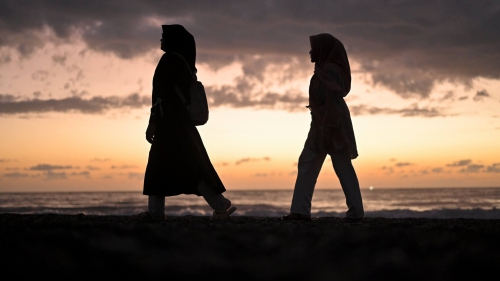Observing Islamic Ethics (Adab) in our Discussions and Decision-making

Islam, as we know, provides a comprehensive system of life. As such, it lays down certain basic principles to guide us in all of our activities.
An essential requirement in all our affairs concerning two or more persons is that of Shura, or consultation. Shura must take place in all situations - in our homes and all other areas of our society. It was denied us by authoritarian regimes back home, and its deficiency has led to multiple problems in our society.
Thus problems that were rarely encountered before now occur with much frequency, such as domestic disputes, domestic violence, increased divorces rates and rowdy, unmanageable children.
We must start consulting our spouses and our youngsters, especially when they become of age (but involved early on) in all family affairs at home. Thus they will develop self-confidence knowing that their ideas are meaningful and are valued. And actively seek opinions from others, and develop an appreciation for them.
And we should restore Shura in all of our collective affairs in the American society for our welfare and improvement. It is clearly laid down in the blessed Qur'an:
 |
|
"Their affairs are decided by consultation between them" (Al Shura, 42:38). |
Even the Prophet Muhammad , who was the recipient of direct guidance from Allah
, was commanded:
 |
|
"Consult them in affairs (of moment)" (Al Imran, 3:159). |
One of the most significant examples of Shura is that of the battle of Uhud. The Prophet was of the opinion that they should fight the Mushrikeen invaders from Mecca from within the town of Madina. But he changed his plans when most Madinans suggested that they should fight outside the town at the Uhud Mountain.
In fact, the Prophet took great pains to carefully delineate his own sayings from that of the Quran'ic revelations. So much so that his companions frequently asked him that a certain opinion he expressed was Qur'anic or his own. And he was pleased that they questioned him.
Following this advice and lead, Ameer-al-Momeen Caliph Omar stated clearly: "There is no khilafah (i.e. caliphate) without consultation."
He even admonished: "Whosoever invites you for his rule or of another without consultation by Muslims, it is not permitted that you do not kill him", meaning they should seek means to remove him from that position of responsibility.
In order to exercise Shura we must develop respect and tolerance for the opinions of each other. It is a pre-requisite for Shura.
Differences arise because Allah did not create us as carbon copies of each other with a uniform mindset, but as unique individuals with a variety of differing talents, capabilities and experiences.
Therefore, the ability to differ is a manifestation of the creative power and wisdom of Allah . It is insurance against rigidity and works for diversity. Differences open minds into thinking in new ways to stimulate intellectual growth and development. And this has served as an engine of progress for the human civilization.
Many of us came to the United States because of the freedom of expression available here. We should therefore invite an open and critical discussion of all our issues so that our community could listen to the divergent and contending views. And weigh them against each other for a productive and beneficial conclusion of an issue facing the community.
It is for this reason that the Prophet said in a Hasan Hadith: "The differences of my Ummah are a blessing."
And in our discussions and debates we must follow all of the Islamic Adab or etiquettes laid down in the Qur'an and the Prophetic Sunnah.
That is - we must listen respectfully, attentively, patiently, and sincerely to the views of each other. And respond gently and politely, even to those who oppose us.
The holy Qur'an tells us:
 |
|
"Invite all to the way of your Lord with wisdom and goodly advice. |
[Note the words for wisdom, goodly advice, and most becoming manner (as superlative adjective)].
While free and open discussion is an Islamic prerogative that we must exercise, after thorough and unrestricted engagement, a consensus (ijma) must be arrived at - otherwise we will go on dwelling on it ad infinitum, and become negligent of other important responsibilities.
Ijma is a requirement of Islamic decision-making process that indicates community approval of the decision. It would crystallize major issues of the community on which our organizations could then take action.
Achieving consensus (ijma) may require compromises between the contending parties, since it is not always possible to reach a complete consensus.
In any case, we are advised to follow the majority consensus rather than to impose a minority opinion; since it may, in effect, open the door to negating the required essential role of society. There are a number of sayings of the Prophet in support of this. Such as, "My Ummah will never agree on wrongdoing": And "You should follow the majority (sawad al atham) of the Ummah.""
It is also important for community to realize that once a consensus is reached, each and every member must adopt it as his or her own (needs repeating for emphasis). And abandon one's own, regardless of how great that opinion may be. It would show respect for the community decision rather than the opinion of a certain individual or individuals.
No one should go about spreading discord and dissension against the decision arrived at. Such a behavior is detrimental to community, and causes (fitna) - disunity, infighting, and strife, which is vehemently condemned by both the Qur'an and Sunnah.
It does not mean that no decision is subject to improvement, revision or change - but it could take place, if called for, in an appropriate setting with sincere motivations for the express good of the community - without any blemish of personal pride or self-aggrandizement.
Many respected Islamic scholars have written at length on the causes of Muslim Ummah's downfall and degeneration.
For example Sheikh Taha Jabir al Alwani who is one of the founders of International Institute of Islamic Thought in Herndon, Virginia. He also founded the Cordoba University in Ashburn, VA, is its president and holds its Imam Al-Shafii chair in Islamic Legal Theory. In his book on "Adab Ikhtilaf fil Islam," or "The Ethics of Disagreement in Islam", he writes:
"The Quran relates to us the history of the followers of earlier prophets that we may derive lessons and warnings from them. It shows clearly how nations rise, how civilizations are built, and how they flourish. It also shows how they decline. We are warned that decline and downfall are direct consequences of disunity and the disease of discord and sliding into narrow factionalism."
Allah tells us in The Qur'an Kareem:
 |
 |
|
"And be not among those who ascribe divinity to any but Allah, |
Disputes which lead to division and disunity amount to abandoning the guidance of the Prophet and becoming alienated from him. This because Allah
addresses the Prophet
in the Qur'an:
 |
|
"Those who have broken the unity of their faith and have become sects." |
This verse expressly condemns all sectarianism arising out of people's intolerance and exclusive claims that they are "the only true exponents" of divine teachings.
An important obligation of all Muslims is to preserve the brotherhood and solidarity of Ummah, starting from within the local community.
Preserving Ummah's brotherhood is close in importance to affirming the oneness of Allah . We are asked to establish community even for our daily salat - most commonly referred to in the Qur'an by the word "Iqamah al-Salah."
Thus as a community we achieve nearness to Allah and overcome obstacles to our renewal of the Islamic life. That is the reason our noble Prophet
sanctioned the most severe punishment for the one who deliberately splits from Jama'ah - the Community.
We should always be on guard against the trap of dissension laid out by the enemies of Islam. This in order to divide and factionalize us. They would thus marginalize us so that we end up into insignificance.
It is important that we take measures against all such malicious schemes of those who are intent on harming us.
Alongside, we must always be cognizant of the value of time. In the ultimate analysis, disputes amount to wasting valuable time (since with a proper perspective they could always be settled separately and cordially). Regardless of how one looks at it, the time thus saved could be most beneficially utilized in the service of community, and for its progressive advancement - and Insha Allah rewarded by Allah here as well as in the eternity of Hereafter through His Grace. Above all, we need to remember that a Muslim's objective in this life is to seek the pleasure of Allah
.
*****
Dr. Siraj Islam Mufti is active in interfaith and community affairs.
Topics: Adab (Islamic Ethics), Ummah (Community) Values: Manners, Morality
Views: 14569
Related Suggestions

















